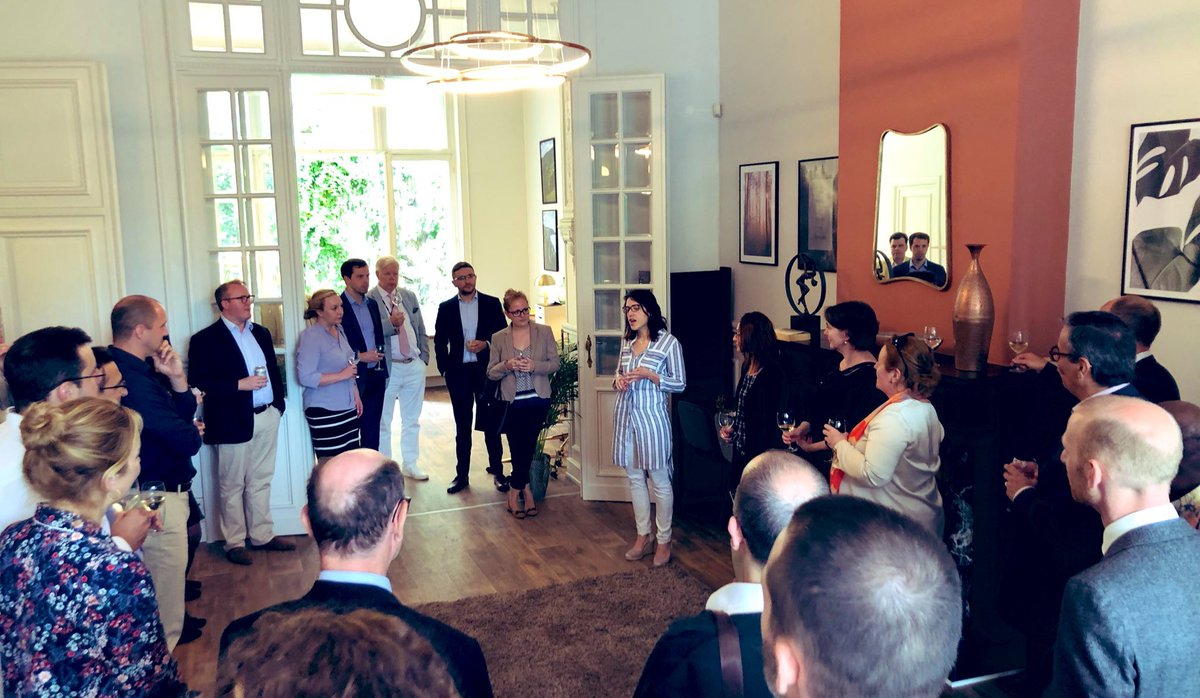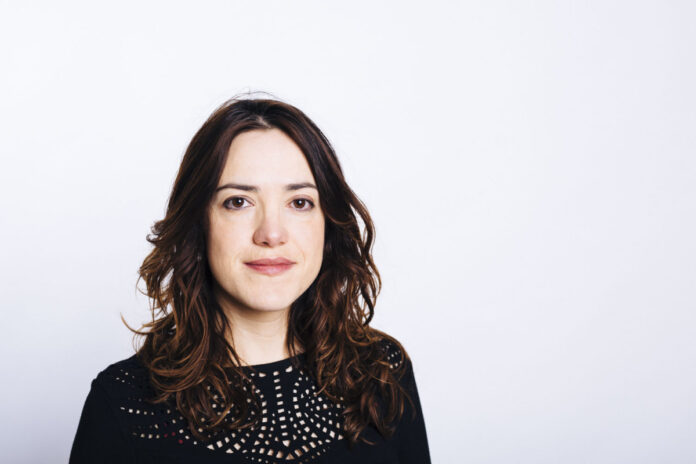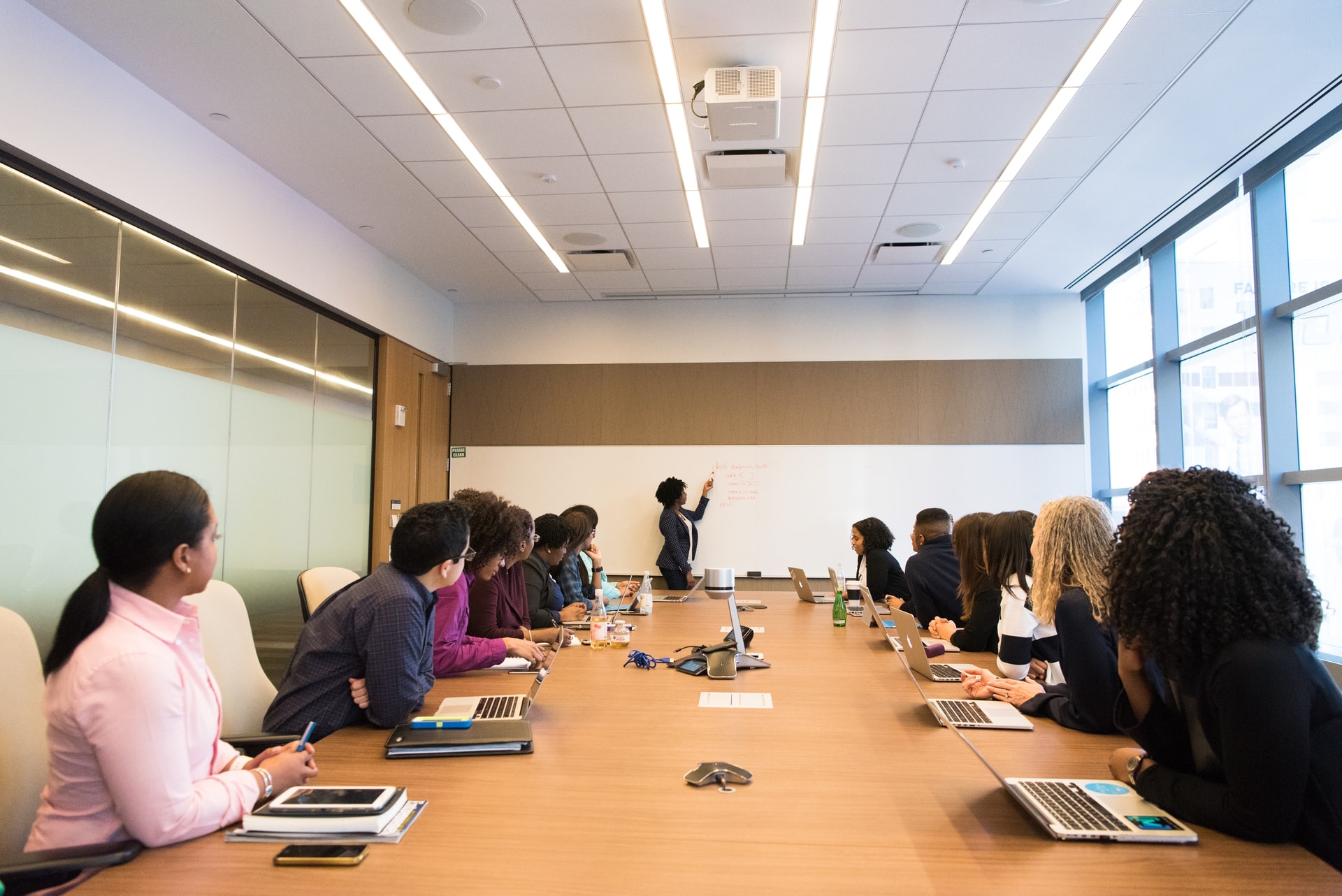Finding a job in times of economic crisis has always been challenging. But never before have job seekers been so out of touch with potential employers. On January 21, Masha Tarle gave a 2-hour workshop to our ELP fellows teaching them practical techniques to engage employers and re-energize their job search. It is not the first time that Masha Tarle, Communication Manager, trainer and coach, took some of her time to voluntarily help our Fellows by giving them specific tools to face the challenging and uncertain job market. If you wish to change your mentality from victim to creator, see your CV as your main marketing tool and engage with your network even when you can’t meet people face-to-face, and how to prepare yourself for a post-coronavirus job market, we invite you to read the interview.
Target Talk Communication Coaching Services | Facebook
- Tell us a bit about yourself. Can you give us a brief description of your professional background and current work?
I am a communication professional and I held roles as Communication manager in agencies, non-profit organizations and international associations. That is what I have been doing for quite some time in Brussels. My other passion is training people in communication skills so, besides my work as communication manager, I am also a communication skills trainer and coach. I help people to communicate better in the workplace as well as with presentations and job interviews. So, I am what you can call a hybrid communication professional. I have been doing this work for almost 10 years.
You might ask how I got into this type of work. I am Croatian but I emigrated to Australia with my family as a child. That is where I fell in love with the English language. I later moved to Spain where I studied English Language and Literature. After my studies, I became an English teacher, teaching mostly business English in companies. After that, I had the opportunity to work for a European politician and former Energy commissioner after which I managed to get a place as a trainee in Brussels. And (as most of us know) when you come to Brussels, it is not always easy to leave. That is what happened to me. I have been living in Brussels for 10 years.
- You have been working in the field of communications for a long time and you now work for Climate Alliance, the largest local and regional network for climate protection in Europe. What is it like to work in Communications for an International network, especially in the sui generis bubble that is Brussels?
Working in communications in a European network is very interesting and definitely something that I feel very comfortable doing. I’ve always known that I wanted to work in an international environment. I went from Croatia to Spain, because my mother was a diplomat who was posted to Madrid. There I was trying to see how I could work in an international organization but it was not easy because at the time Madrid was not very international. So, although I loved Madrid and its people, I wanted to move to Brussels when the opportunity came.
What I really like in the Brussels bubble job market is the fact that there are people from all over Europe. We do have something in common: we all speak many languages and it is quite easy to connect with each other. You are always working with people who come from different backgrounds, cultures, who have different ideas than yours and with whom you need to work. This is where communication comes in really handy because you need to find that common ground.
Another motive is the opportunity to learn – and this is the good thing about Brussels. Even if you only work as a communications person or as a policy person, you will most likely change the topics that you are working on during the years. I have worked on energy, on transport and on education for example. That is really exciting for someone who is curious about the world and is interested in different topics. Working in international organizations in Brussels means that you are constantly learning and always (re) discovering yourself. These are the main reasons I love working in Brussels.

- Finding a job in today’s fast-changing world, in times of economic crisis and during a pandemic is very challenging, especially for young people. What communication skills would you say are important to have to be able to succeed and find a job?
The first skill is not so much a skill or a communication skill. It’s about a change of mentality. When we are looking for a job, our mentality needs to adapt. We usually assume that young people adapt quickly, but I don’t think so. I believe that young people, just like older people, often live isolated in their own worlds. Nowadays, with internet, we live in the world that interests us and we mainly surf on topics we identify with. That means that we are kind of isolated. So sometimes we fall into a mentality of saying “this is not possible” or sometimes the contrary. Sometimes we think everything is possible. There is a need to change the mentality, to be realistic, but at the same time to say: “There is something I can do, there is a job for me and there is a place in the world that I can find for myself”.
The second thing is having the skills to analyse the market. We need to have analytic skills to understand what the labour market is like both where we live and globally. If we lack this info, we need to find who can explain it to us. Then we need to see where do our skills and our interests fit in the whole job market today? What kind of job openings are there?

The third skill, which is really going to throw us into communication is the skill of networking well (or social skills). How do we relate to other people? Do we manage keep in contact with some of the people that we have met? How do you get out of your bubble and not just socialize with people who are close to you, but actually maintain a network? Then we have the writing skills. Our CV and cover letter are our main marketing tools, so we need to be good marketers. We have to think of ourselves almost as a company, in a sense that we live in a world that is constantly changing and constantly needing different things from you. So, we need to be able to analyse and adapt – this is what entrepreneurs do.
Young people need all these skills: the mentality, the analytic skill, the networking skill and the writing skills in the frame of being almost an entrepreneur.
- Nowadays, the job market is very dynamic/demanding and there is a lot of competition. How do make your CV get noticed? How do you sell yourself?
We need to know that there is no longer a general CV. Every tool needs to be adapted to the audience every single time. While this is a lot of work but you need to change your mentality. You have to tell yourself “from now on, for the next 20 years, I’m going to have 50 versions of my CV. And that’s okay.” The key is really to say “I am going to have to tailor each and every CV and cover letter for every application. That means that I don’t have the luxury of sending out hundreds of CVs. It’s not about the numbers but about the process”. I need to specifically target what I want- and I therefore need to put some time and thought in finding what I want to do. Of course, it’s easier to know what you want as you age, because when you have past experience, you can sell yourself as a, b or c. Sometimes, when there is a blank, it’s a bit difficult to start.
What you do have as a young person without a lot of experience, is your talent, your interest and, hopefully, your passion. The key is to tailor every CV and to be able to transmit, through that document, that unique personality, that unique talent, that unique interest that you have. How is that done?
Today, CV trends are constantly changing. But you need to create a list of keywords and action words to use in your CV that are related to your ideal post. Action words are the ones that are going to jump out of the page to the employer. The third thing, is to have results. You need to convert and translate your actions and daily activities into results, ideally quantifiable results. The results need to be there as employers look for proof od past results for future success.
- What advice would you give to young people who are trying to find a job during the pandemic?
I would first say “don’t despair” because this is not the time to despair. We are living in a long pause. We can use this pause to think and prepare our marketing tools. This is the time to polish your marketing tools and to find out, as much as possible, what kind of posts are available.
My advice would be: do not despair, there are jobs. We are living globally and today you can find a job in the US, for example, without even being there. This is the opportunity to look around and try as many different places as possible. There are many opportunities, but it is important to start with your network.
That is also another bit of advice I would give: Start networking with the people you know, even those who seem they have nothing to offer. You can have a quick chat online; you can reach out and say “I would just need 30 minutes of your time because I would really like to understand what you do professionally”. Don’t be afraid of reaching out.
- In almost any career field or job position, it’s important to have communication skills communication skills to present a new project or to intervene in a meeting. There are any number of specific tools to overcome the anxiety and stress of speaking in public (even in small groups)?
To overcome stress and anxiety, you need to prepare your content very well because that is what is going to matter. Even if, in the beginning, you are afraid or if you need to read from a paper, that doesn’t matter. What is important is to have content that is relevant, that catches people from the beginning and that is well structured. As a public speaker and trainer, I have discovered that content is much more important than anything else. Some trainers believe that you need to practice breathing methods and some other voice or body techniques (and of course this can help) but good content is your lifeboat.
And why? Because you have prepared your content well you will gradually connect with your audience. You are going to say something that’s going to make them laugh, you’re going to say something that’s going to make them listen, or you’re going to ask them a question. Then, the ice is going to start melting away. So, little by little, you are going to get comfortable with the audience, you’re going to practice, you’re going to have positive experiences. You’re going to have that zoom call that will go really well, then you’re going to have a zoom call with 50 people that’s going to go even better. Little by little, you are going to associate public speaking to something positive.
There are people, (but this is the minority) who have extreme anxiety. But that usually has some psychological reasons. With my clients, I try to analyse what is going on. Often (and this is a minority) I can sense people who have been silenced as children, who have been bullied as children or even adults, people with a low sense of self-worth and so on. These are things that apparently have nothing to do with public speaking, but they do appear in public speaking. Situations where you felt ashamed but repressed, might came back years later when you are 50 and surprise you while you are giving a speech to a big audience. These are the situations that need to be treated but there is a way to get through this.
We also need to identify (and that is what I do as a coach) your strengths and your value. Sometimes you don’t know yourself well, it is not easy to believe in yourself and that you are actually very good at something. In public speaking, we always start with “How can I inspire trust in my audience? That is where, both the content and knowing who you are comes in handy.
- When it comes to public speaking and communication to large audiences, what advice do you give to clients for whom English is not their native language?
When English is not the native language people might be afraid to share their message. They often use it also as an excuse. They say: “But, I am not a native speaker! “They focus on what they lack: the perfect grammar, the right words, the pronunciation. I encourage people, being an English teacher myself, to continue reading and listening English and getting a pronunciation teacher if that helps them. But I strongly believe that communication skills live in a sphere outside individual language competency. I call this “communication fluency”. It is the capacity to communicate with your eyes, your intent, with your soul. Those are going to immediately open doors to other people’s minds and hearts. The first step is really to want to communicate and connect. All the rest will come later.
- That’s very interesting. When you do what you are passionate about, you do it with all your heart. You are creative and you inspire others and you can create a connection and empathize with your audience.
Yes, and it’s easy, right? Any work becomes easy because you love it and some people can show that even without speaking a language very well.
- What is your mission?
My mission is to serve others through my communication services. It is very important to ask ourselves the question of how we serve others. This is the key point. I have finally found a way how I serve others. The key for the job seekers of tomorrow is find what their value is and how they can serve others. Once you stop serving others completely, I think that is where you lose the sense of why your work has value and makes sense. If you know deep inside what your value is, and how you can serve others with your talents, then I think you’re always going to be employed, in some capacity or another.
Masha Tarle
Communication Manager, trainer and coach
Interview by Soraia Ribeiro



